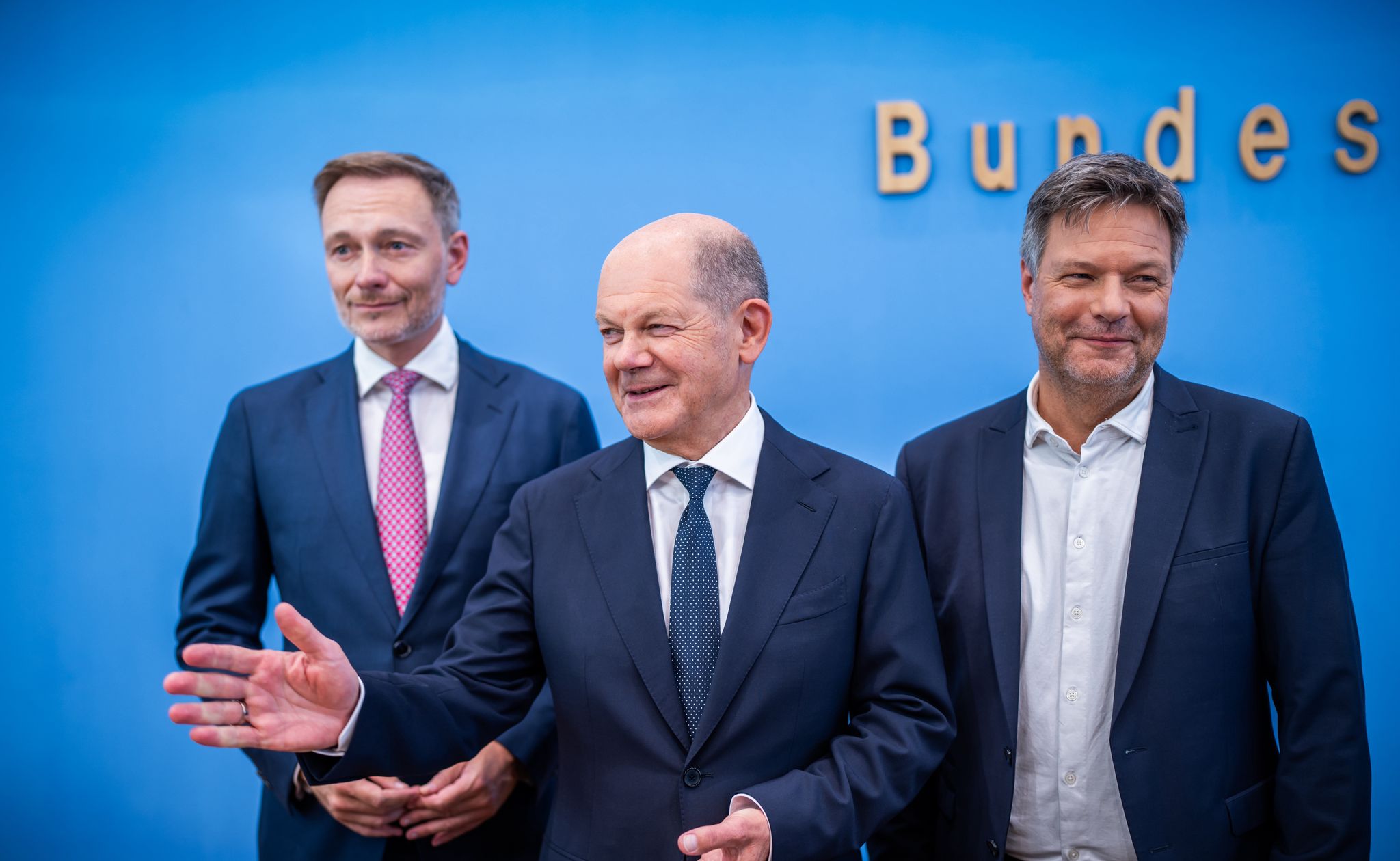Germany’s Cabinet Set To Approve 2025 Budget After Prolonged Negotiations
...As Faeser Bans Compact Magazine, Says It’s ‘Mouthpiece Of Far-Right Extremists’

German Chancellor Olaf Scholz (C) Robert Habeck (R), German Minister for Economic Affairs and Climate Protection, and Christian Lindner, German Minister of Finance, take part in a press conference on the 2025 budget.
German Cabinet is poised to approve the long-contested 2025 budget after weeks of wrangling over the finances of Europe’s largest economy.
The draft, negotiated by the coalition leaders – Chancellor Olaf Scholz of the Social Democratic Party (SPD), Economy Minister Robert Habeck of the Greens and Finance Minister Christian Lindner of the pro-business Free Democratic Party (FDP), calls for a total budget of €480.6 billion (about $524 billion) – slightly less than this year.
Lindner is planning new loans totaling €43.8 billion, the maximum allowed by Germany’s strict rules against ordinary budget deficits, known as the debt brake, which is enshrined in the country’s constitution.
Scholz, Habeck and Lindner have been trying for weeks to close a financing gap of around €30 billion. It remains unclear if they have succeeded, as measures totaling about €8 billion are still under constitutional and economic review.
The Cabinet is also expected to approve a supplementary budget for the current year. The coalition plans to take on around €11 billion in additional debt just as the debt brake will nevertheless be adhered to, as it allows the federal government to take on higher loans due to the weaker economy.
The German News Service (delivered by dpa) reports that key points for a growth initiative are also to be decided and that the measures are intended to increase economic growth by around 0.5 percentage points in the short term.
Companies are to receive incentives for investment through better depreciation conditions, while employees will get financial incentives for overtime and work during retirement. Additionally, the government aims to make working in Germany more attractive for foreign skilled workers.
Meanwhile, German Interior Minister, Nancy Faeser, has banned the magazine Compact, considered “a mouthpiece of the far-right extremist scene,” her ministry said on Tuesday, July 16, 2024.
Affiliated production company, Conspect Film GmbH, has also been banned, according to a statement.
The Police have raided the outlet’s premises in Falkensee, just outside Berlin, as well as the homes of leading managers and shareholders in the states of Brandenburg, Hesse, Saxony and Saxony-Anhalt to confiscate assets and evidence, it said.
Faeser justified the ban by saying that Compact is a “central mouthpiece of the far-right extremist scene.”
“This magazine incites hatred against Jews, against people with a history of migration and against our parliamentary democracy in an unspeakable manner,” the minister said.
Compact is a monthly political magazine led by its Editor-in-Chief, Jürgen Elsässer, who likes to incite his audience at events with slogans like “Americans go home” and “Friendship with Russia.”
The magazine’s leading figures maintain contacts with important figures of the far-right scene.
In its online shop, the outlet offers a coin with the image of Björn Höcke, a firebrand politician from the far-right Alternative for Germany (AfD) who was recently convicted and fined again for using a banned Nazi slogan.
Germany’s domestic intelligence service, known as the Office for the Protection of the Constitution, classified Compact as a proven far-right extremist publication in late 2021, saying the magazine spreads “anti-democratic and inhumane” positions.
Faeser said the ban shows “that we are also taking action against the intellectual arsonists who are fuelling a climate of hatred and violence against refugees and migrants and want to overcome our democratic state.”
In order for an organization to be banned in Germany, it is not enough that it propagates an anti-constitutional stance, but it must do so in an aggressive and militant manner.
In its statement, the Interior Ministry cited fears that readers and viewers of Compact content could be incited and encouraged to carry out anti-constitutional acts. Compact publications “aggressively propagate the overthrow of the political order,” it said.











